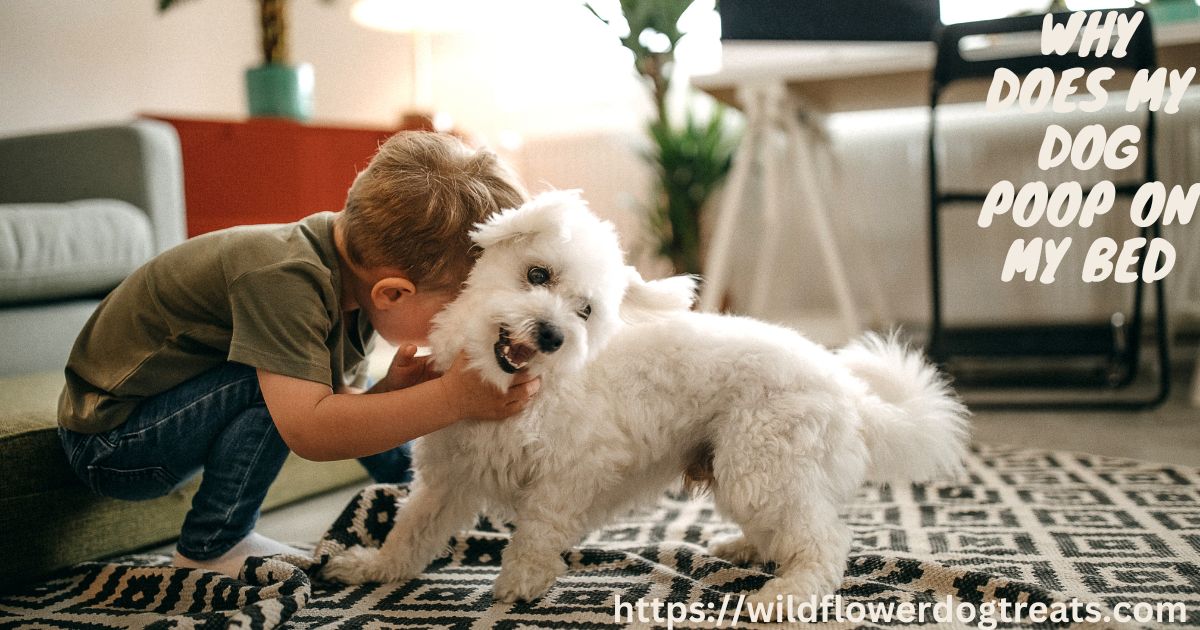My dog may poop on my bed due to territorial marking or because of an underlying medical issue. Why Does My Dog Poop on My Bed. Having a dog that poops on your bed can be frustrating and confusing.
You may wonder why your furry friend would choose your bed as their designated toilet when there are clearly more suitable options available. The truth is, there could be a number of reasons behind this behavior. It’s possible that your dog is engaging in territorial marking, claiming your bed as their own.
Another possibility is that there is an underlying medical issue, such as digestive problems or anxiety, causing your dog to have accidents on your bed. Understanding the reasons behind this behavior can help you find a solution to prevent it from happening in the future.
Understanding the reasons behind your dog’s behavior involves delving into various factors that contribute to this specific action. By unraveling these elements, you can gain insights into why your dog exhibits the behavior of pooping on your bed. This understanding is crucial for addressing and effectively managing this frustrating behavior. By delving into the underlying reasons, such as anxiety, territorial marking, or medical issues, you can work towards finding a solution that will keep both you and your furry friend happier.
Understanding the reasons behind your dog’s behavior involves delving into various factors that contribute to this specific action. These may include aspects related to your dog’s health, emotions, environment, and their communication methods. By unraveling these elements, you can gain insights into why your dog exhibits the behavior of pooping on your bed.
Dogs play an integral role in our lives, bringing joy, companionship, and endless amounts of love. However, it can be perplexing and frustrating when our furry friends exhibit inappropriate elimination behavior, such as pooping on our beds. Why Does My Dog Poop on My Bed. To address this issue, it’s crucial to delve into the underlying reasons behind this behavior. Understanding your dog’s instincts and natural behaviors, recognizing the impact of stress and anxiety, as well as exploring the connection between health issues and inappropriate elimination, can provide essential insights into why your dog may be engaging in this behavior.
Understand Your Dog’s Instincts And Natural Behaviors
As pack animals, dogs have a natural instinct to mark their territory as a way of establishing their presence and asserting their dominance. Urinating or defecating in specific areas, such as your bed, can serve as a territorial marker for them. Additionally, dogs have an innate desire for cleanliness and comfort, which may explain why they choose your bed as a spot to relieve themselves. By providing your dog with an appropriate designated area for elimination and using positive reinforcement, you can redirect their natural instincts towards the desired behavior.
Recognize The Impact Of Stress And Anxiety On Dogs
Stress and anxiety can greatly affect your dog’s behavior, including their elimination habits. Changes in routine, new additions to the household, separation anxiety, or exposure to loud noises can all contribute to heightened stress levels in dogs. Why Does My Dog Poop on My Bed. In response, they may seek comfort and security by eliminating in familiar and scent-laden areas, such as your bed. Creating a calm and secure environment for your dog through routine, exercise, and mental stimulation can help alleviate stress, reducing the likelihood of inappropriate elimination.
Explore The Connection Between Health Issues And Inappropriate Elimination
Unusual elimination behavior can also be an indication of underlying health issues in dogs. Medical conditions such as urinary tract infections, gastrointestinal problems, or dietary sensitivities can lead to discomfort and an increased frequency of elimination. If your dog’s inappropriate elimination persists or is accompanied by other symptoms such as lethargy, changes in appetite, or diarrhea, it’s crucial to consult with your veterinarian for a thorough examination. Identifying and addressing any potential health concerns is vital in resolving this behavior.
Signs That Indicate A Problem
If your dog is repeatedly pooping on your bed, it could indicate a problem that needs attention. Look out for signs like unusual behavior, health issues, or anxiety as possible causes. Don’t hesitate to seek professional advice to resolve the issue.
Identifying Unusual Behavior In Your Dog
Your furry friend’s behavior can sometimes be puzzling, especially when they exhibit unusual habits like pooping on your bed. While it may leave you feeling frustrated and confused, it’s essential to realize that there could be an underlying problem causing this behavior. By paying attention to certain signs and cues, you can gain a better understanding of what might be going on with your dog.
One key indicator that something is amiss is when your dog suddenly starts displaying unusual behavior. If your dog has never had accidents indoors before, and all of a sudden, they’re consistently relieving themselves on your bed, it’s a sign that they’re trying to communicate something to you. Dogs often resort to extreme measures to capture their owner’s attention when they’re feeling distressed or are facing discomfort.
Recognizing Signs Of Distress Or Discomfort
Dogs are unable to verbally express themselves, so they resort to nonverbal cues to communicate their distress or discomfort. Paying close attention to your dog’s body language can give you valuable insights into their emotional state. Some signs you should be on the lookout for include:
- Pacing or restlessness
- Excessive panting or drooling
- Excessive grooming or licking of specific body parts
- Loss of appetite
- Excessive whining or barking
- Avoidance or hiding behavior
If you notice any of these signs in conjunction with your dog’s bed-pooping behavior, it’s crucial to take their distress seriously. These signs may indicate a physical issue, such as a urinary tract infection or gastrointestinal problems, or it could be a manifestation of anxiety or stress. Consulting with a veterinarian is highly recommended to rule out any underlying health issues.
Understanding The Difference Between Marking And Elimination
While it’s easy to assume that your dog is purposely marking their territory when they poop on your bed, it’s important to understand the distinction between marking and elimination. Marking typically involves a small amount of urine or feces left in specific spots to establish dominance or communicate with other dogs. Elimination, on the other hand, pertains to the act of relieving oneself when necessary.
If your dog is urinating or defecating on your bed in larger amounts, it’s more likely a case of elimination rather than marking. This behavior could indicate a problem with their house-training, a medical issue, or again, distress and discomfort. By understanding this distinction, you can better assess the situation and address the underlying cause in an appropriate manner.
Common Reasons Why Dogs Poop On The Bed
Common Reasons Why Dogs Poop on the Bed
If you’ve ever wondered why your furry friend chooses your bed as their personal toilet, you’re not alone. Dogs pooping on the bed can be a frustrating and unpleasant experience for any pet owner. But before you start pointing fingers or punishing your furry companion, it’s essential to understand the common reasons why dogs engage in this behavior. By identifying the underlying causes, you can address the issue more effectively and help your dog break this undesirable habit.
Territorial Marking And Dominance Issues
One common reason why dogs may choose to leave their mark on your bed is territorial marking. Dogs are instinctively driven to establish and maintain territories, and marking is their way of claiming ownership. Through their feces, dogs leave a scent that communicates to other animals that the area is “theirs.” In some cases, dogs may also engage in this behavior to assert their dominance.
This behavior is more common in intact male dogs that have not been neutered, as their hormones drive them to mark their territory more frequently. However, any dog can display territorial marking behavior, regardless of gender or neuter status. It’s important to address this behavior promptly to establish yourself as the pack leader and provide your dog with appropriate boundaries.
Separation Anxiety And Loneliness
When dogs experience separation anxiety or feel lonely, they may express their distress through eliminating on the bed. Dogs are highly social animals that thrive on companionship and can become incredibly attached to their human family members. If they feel anxious or abandoned when left alone, they may resort to leaving their scent on your bed as a means of finding comfort and security.
This behavior can be particularly prevalent in dogs that have not been adequately trained to cope with being alone or have recently experienced a significant change in their routine or living situation. Helping your dog overcome separation anxiety involves implementing appropriate training techniques, gradually desensitizing them to your absence, and ensuring they have plenty of mental and physical stimulation.
Inadequate Bathroom Training And Routines
Another common reason why dogs may poop on your bed is inadequate bathroom training and routines. Dogs rely on consistency and regular opportunities to eliminate properly. If they haven’t been properly trained or have inconsistent bathroom routines, they may resort to relieving themselves on the bed out of convenience or confusion.
It’s crucial to establish a regular bathroom routine for your dog, particularly when they are young or newly introduced to your home. Consistently taking them outside or providing them with designated indoor bathroom spots at appropriate intervals can help reinforce their understanding of where they should eliminate and reduce the likelihood of accidents occurring on your bed.
Medical Conditions That Cause Increased Urgency Or Lack Of Control
In some cases, dogs may poop on the bed due to underlying medical conditions that increase urgency or cause a lack of control over their bowel movements. Conditions such as gastrointestinal infections, inflammatory bowel disease, or even neurological disorders can affect a dog’s ability to hold their bowel movements or control the urge to eliminate.
If your dog’s pooping behavior on the bed is sudden or accompanied by other concerning symptoms such as diarrhea, vomiting, or changes in appetite, it’s crucial to consult with a veterinarian. A thorough medical evaluation can help identify any underlying health issues that may be contributing to this behavior. Treating the underlying condition may help resolve the problem and alleviate your dog’s discomfort.
Understanding the common reasons why dogs choose to poop on the bed is the first step towards finding a solution. By addressing territorial marking, separation anxiety, inadequate training, and potential medical issues, you can work towards establishing appropriate behaviors and preserving the cleanliness and comfort of your sleeping space.
Tips For Preventing Your Dog From Pooping On The Bed
If your furry friend has an unfortunate habit of using your bed as a toilet, it can be frustrating and inconvenient. However, with the right strategies, you can teach your dog to avoid this behavior. Here are some effective tips for preventing your dog from pooping on the bed:
Establish A Consistent Potty Schedule And Routine
Consistency is key when it comes to preventing accidents in the house. Ensure that your dog has regular potty breaks throughout the day, particularly after meals and playtime. By establishing a routine, your dog will learn when and where it’s appropriate to relieve themselves.
Provide Ample Opportunities For Exercise And Mental Stimulation
Dogs that are bored or have pent-up energy are more likely to engage in undesirable behaviors, such as pooping on the bed. Make sure your dog gets plenty of physical exercise and mental stimulation through walks, playtime, and interactive toys. A tired and mentally satisfied dog is less likely to engage in inappropriate bathroom behavior.
Create A Designated And Comfortable Sleeping Area For Your Dog
Ensure that your dog has a comfortable and inviting sleeping space of their own, complete with a cozy bed or blanket. By providing a designated sleeping area, your dog will be less inclined to seek out your bed for bathroom purposes. Make their sleeping area an appealing and safe space.
Implement Positive Reinforcement Training Techniques
Use positive reinforcement to encourage your dog to go potty in the appropriate spot, such as outside in the yard. When your dog eliminates in the correct location, praise and reward them with treats or verbal affirmation. Positive reinforcement helps your dog understand where they should and should not relieve themselves.
Seek Professional Help If Needed
If your dog continues to struggle with house training or has developed a stubborn habit of pooping on the bed, consider seeking professional help from a certified dog trainer or behaviorist. They can provide personalized guidance and training techniques to address the issue effectively.
Dealing With The Aftermath: Cleaning And Behavior Correction
After finding a pet mess on your bed, promptly clean it and take steps to prevent future incidents. Address behavioral issues through training, use deterrents, and employ effective cleaning methods.
Steps To Effectively Clean And Deodorize Your Bed
When it comes to cleaning pet messes on your bed, it’s crucial to act promptly and thoroughly. Here are some steps to effectively clean and deodorize your bed:
- Remove any solid waste with a disposable glove or paper towel.
- Blot the affected area with a clean cloth or paper towel to absorb excess moisture.
- Apply a pet-safe enzyme cleaner to break down and neutralize odor-causing bacteria.
- After cleaning, allow the mattress to air dry completely before using it again.
Addressing The Underlying Behavioral Issues Through Training And Enrichment
Understanding the underlying reasons for your dog’s behavior is essential in addressing and correcting it. Training and enrichment activities can help address behavioral issues:
- Consult a professional trainer to address any behavioral problems through positive reinforcement techniques.
- Provide mental and physical stimulation through interactive toys, puzzles, and regular exercise to prevent boredom.
- Establish a consistent routine and provide a designated potty area for your dog.
Utilizing Deterrents And Tools To Prevent Future Incidents
To discourage your dog from repeating the behavior, consider utilizing deterrents and tools:
- Use pet gates or barriers to restrict access to certain areas of the house, including your bedroom.
- Invest in a comfortable and appropriately sized dog bed to provide your pet with a designated sleeping area.
- Consider the use of pheromone-based products or natural repellents to discourage unwanted behavior.
Frequently Asked Questions On Why Does My Dog Poop On My Bed
Why Does My Dog Poop On My Bed?
Dogs may poop on the bed due to anxiety, medical issues, or lack of proper training. It’s essential to observe their behavior and consult a vet to rule out any health concerns. Additionally, providing a comfortable and secure environment for your dog can also help prevent this behavior.
How Can I Stop My Dog From Pooping On My Bed?
To prevent bed-pooping, establish a consistent potty routine, provide ample outdoor time, and use positive reinforcement when your dog eliminates in the right place. Also, ensure your dog feels secure by creating a cozy sleeping area and addressing any potential anxiety triggers.
What Medical Conditions Could Cause A Dog To Poop On The Bed?
Medical issues such as gastrointestinal problems, parasites, or urinary incontinence could lead to dogs pooping on the bed. If bed-pooping behavior persists or is accompanied by other symptoms, seek veterinary attention for a comprehensive assessment and appropriate treatment.
Conclusion
Understanding why your dog poops on your bed is crucial for addressing this frustrating behavior. Prevent your dog from pooping on the bed by addressing anxiety, medical issues, and training. Provide a comfortable environment, consult a vet if needed, and reinforce positive behaviors for a happier living space





